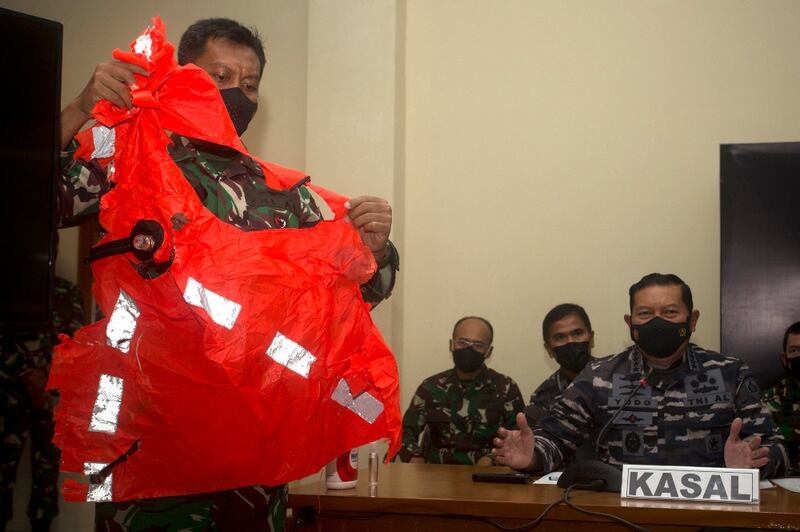Indonesia has ended a month-long effort to salvage a submarine that sank near Bali in April with 53 sailors on board, as officials said Wednesday that the difficulty and risk involved in bringing the broken vessel to the surface was too great.
Three Chinese naval ships were involved in the operation to salvage the KRI Nanggala-402, which was found broken into three pieces at a depth of 838 meters (2,749 feet) in the Bali Sea. One of the ships was able to recover a pair of life rafts that belonged to the doomed submarine, officials said.
“The salvage operation has ended. Three Chinese Navy ships have also left Bali waters, Indonesian Navy spokesman First Adm. Julius Widjojono told BenarNews, an RFA-affiliated online news service.
“The risk and difficulty levels are very high,” he said, citing the steep seabed slopes and underwater waves as among the dangers.
The German-made KRI Nanggala-402 was taking part in a torpedo-firing exercise off the northern coast of Bali Island when it lost contact after it dove as it was about to receive clearance to fire on April 21, officials said.
All 53 crew members are presumed dead, and not a single body has been found.
The Indonesian Navy called the salvage operation “successful,” in a statement posted its website.
During the month-long salvage attempts, teams conducted 20 dives and managed to lift important objects and items, it said, without providing details.
A former commander of the Nanggala-402 said last month that a powerful underwater current, known as an oceanic nonlinear internal solitary wave, might have dragged the submarine down and caused it to sink.
The submarine, which weighed up to 1,395 tons and measured 59.5 meters (195 feet) long, was found broken apart on the seabed on April 25, culminating an earlier search effort that involved ships and aircraft from Australia, India, Malaysia, Singapore, and the United States.

A military officer displays a life jacket found in the waters during a search for the Indonesian Navy submarine KRI Nanggala, at Ngurah Rai Military Air Base in Bali, Indonesia, April 25, 2021. [AP]
The Indonesian Navy thanked the Chinese military for taking part in the salvage operation.
“We would like to express our highest gratitude to the crews of the ships that were involved in the salvage mission and apologize for any inconveniences during the operation,” the navy said in a statement.
During the salvage operation, the Chinese crew tried to gather as much documentation as possible in the form of photos and videos, said China’s defense attaché to Indonesia, Senior Col. Chen Yongjing.
“This is concrete proof of humanitarian rescue activities carried out with the Indonesian Navy,” Chen said in a statement released by the Indonesian Navy on Wednesday.
“This activity is a milestone in the development of a comprehensive strategic partnership between the two navies.”
More submarines needed
Meanwhile, Julius Widjojono, the Indonesian navy’s spokesman, confirmed to BenarNews a plan to acquire additional submarines, but said the final decision rested with the defense ministry.
In May, the House of Representatives’ defense committee revealed a strategic plan to procure eight to 10 submarines for the navy by 2029. With the loss of the KRI Nanggala-402, Indonesia has four submarines left in its naval fleet.
“How many submarines does Singapore, a small country, have? We, as the largest archipelagic nation, had only two at one point,” Julius told BenarNews, referring to a time when three of the military’s submarines were out of service.
Indonesia has also cooperated with Daewoo Shipbuilding and Marine Engineering, a South Korean firm, to build submarines. The KRI Alugoro-405, one of three Indonesian submarines ordered from Daewoo, is the first to be partly assembled locally.
The KRI Nanggala-402 was built by German company Howaldtswerke-Deutsche Werft in 1977 and came into service in 1981, the Indonesian military had said. From 2009 to 2012, the submarine was retrofitted by Daewoo, officials had said.
Reported by BenarNews, an RFA-affiliated online news service.
